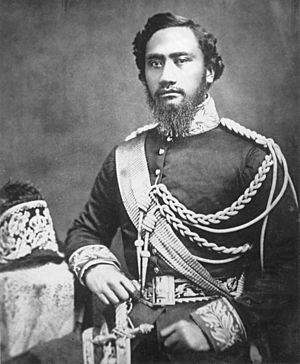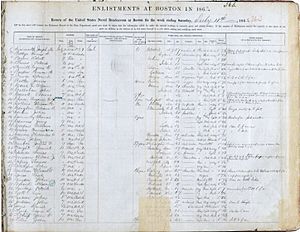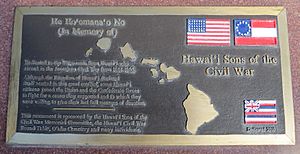Hawaii and the American Civil War facts for kids
When the American Civil War started, the Kingdom of Hawaii decided to stay neutral. This happened on August 26, 1861, under King Kamehameha IV. Even though Hawaii was neutral, many Native Hawaiians and Americans born in Hawaii joined the fight. They enlisted in armies for both the Union (the North) and the Confederacy (the South).
Contents
Hawaii's Choice: Staying Neutral in the War

When the American Civil War began, Hawaii worried about attacks from Confederate ships. These ships were called privateers. The Hawaiian government discussed what to do.
Foreign Minister Robert Crichton Wyllie thought Hawaii should declare itself neutral. This meant not taking sides. Hawaii had done this before during the Crimean War in 1854.
King Kamehameha IV and Finance Minister David L. Gregg were worried. They didn't want to upset the United States. Recognizing the Confederacy as a separate country could cause problems. But then, the United Kingdom and France also declared their neutrality. So, the King and Gregg agreed.
On August 26, 1861, King Kamehameha IV officially announced Hawaii's neutrality. He stated that Hawaii would not support either side. He also said that no one in Hawaii should help privateers. No captured ships or goods could be sold in Hawaii either.
"Spencer's Invincibles" and Neutrality
Before Hawaii declared neutrality, an American businessman named Captain Thomas Spencer formed a group. He paid for and trained a company of soldiers in Hilo. Most of these soldiers were Native Hawaiians. They were called "Spencer's Invincibles."
These volunteers wanted to help President Lincoln and the Union. However, King Kamehameha IV and Foreign Minister Wyllie said no. They had to protect Hawaii's neutrality. Captain Spencer was very sad when he heard the news.
Hawaiians Who Fought in the War
Even though Hawaii was neutral, many Hawaiians still joined the war. This included Native Hawaiians and Hawaii-born Americans. Many were descendants of American missionaries. They joined armies for both the Union and the Confederacy.
Hawaiians had served in the U.S. Navy and Army since the War of 1812. Even more joined during the Civil War. Many Hawaiians supported the Union. This was because Hawaii had strong ties to New England through missionaries and whaling. Also, many Hawaiians were against slavery. Hawaii's Constitution of 1852 had already outlawed slavery.
Sons of American missionaries in Hawaii also joined. Many were students at Punahou School. Some well-known Hawaiians who fought include:
- Henry Hoʻolulu Pitman
- Samuel C. Armstrong
- Nathaniel Bright Emerson
- James Wood Bush
- Prince Romerson
- J. R. Kealoha
In July 1863, two sailors from Hawaii joined the U.S. Navy in Boston. They were listed as coming from the "Sandwich Islands," which was an old name for Hawaii. John Davis (age 23) and Samuel Jones (age 25) were both listed as "Ordinary Seamen."
Researchers have found records for 119 Native Hawaiian and Hawaii-born fighters. But the exact number is still unknown. Many Hawaiians used English names when they joined. This makes it hard to find all their records.
Remembering Hawaii's Role
Many Civil War veterans are buried in Honolulu's Oʻahu Cemetery. Most of these veterans were from other states. They moved to Hawaii after the war.
On August 26, 2010, a special plaque was placed in Honolulu. It is at the National Memorial Cemetery of the Pacific. This date was the anniversary of Hawaii's neutrality announcement. The plaque honors the "Hawaii Sons of the Civil War." It remembers the more than one hundred Hawaiians who fought in the war. They served for both the Union and the Confederacy.
In 2013, a group of people started working on a documentary. It tells the stories of Hawaii-born soldiers and sailors in the Civil War. In 2015, the National Park Service released a book. It was called Asians and Pacific Islanders and the Civil War. This book shared the stories of many fighters from Asian and Pacific Islander backgrounds. It included information about Hawaii's part in the war. It also had biographies of people like Pitman, Bush, and Kealoha.
 | Claudette Colvin |
 | Myrlie Evers-Williams |
 | Alberta Odell Jones |



